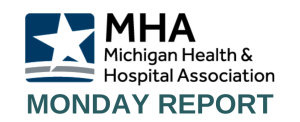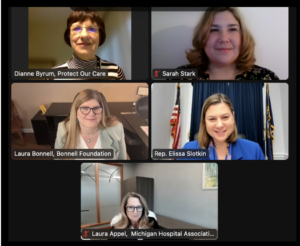The Michigan Department of Health and Human Services (MDHHS) recently released a final policy bulletin informing providers that Medicaid eligibility redeterminations will resume in June 2023 for the first time since early 2020, with some enrollees who no longer meet program eligibility criteria losing coverage as early as July.
The Medicaid program has grown to nearly 3.2 million Michiganders, an increase of more than 700,000 when compared to pre-pandemic levels. The MDHHS will complete eligibility redeterminations for all Medicaid enrollees over a 12-month period. Hospitals are encouraged to discuss the importance of updating Medicaid patient contact information in the state’s MI Bridges system and how to maintain Medicaid coverage or find new coverage on the federal marketplace. Hospitals are invited to join the MHA, the Michigan Primary Care Association, the Michigan Association of Health Plans and other stakeholders for a members-only webinar March 20. This will cover the redetermination processes, timelines and provider roles.
The MDHHS also announced that it has started unwinding many of the changes that were made to the Michigan Medicaid program in order to ease rules and provide flexibilities to providers as a result of the COVID-19 public health emergency (PHE). Michigan will continue to unwind the pandemic-related program changes before the authority for these policies expires on May 11, 2023. The MHA will host an additional webinar on March 30 to cover details of the PHE ending and what hospitals need to know.
The MDHHS developed a website with information important to providers that will be updated as new information becomes available. The Centers for Medicare & Medicaid Services also recently released a fact sheet related to the PHE expiration’s impact on:
- COVID-19 vaccines, testing, and treatments.
- Telehealth services.
- Healthcare access and continuing flexibilities for healthcare professionals.
- Inpatient hospital care at home.
Members with questions are encouraged to contact Jason Jorkasky at the MHA.


 MHA-supported Bills See Action Before Break
MHA-supported Bills See Action Before Break MHA Celebrates ACA Anniversary with Congresswoman Slotkin
MHA Celebrates ACA Anniversary with Congresswoman Slotkin MHA, Industry Leaders Gather at Trinity Health to Discuss Food Insecurity
MHA, Industry Leaders Gather at Trinity Health to Discuss Food Insecurity Expanding Advocacy Roots with the Next Generation
Expanding Advocacy Roots with the Next Generation Affordable Care Act 2.0: New Trends and Issues, New Urgency
Affordable Care Act 2.0: New Trends and Issues, New Urgency